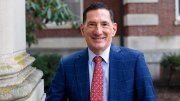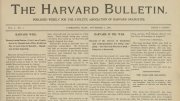If there’s one thing Will Makris, Ed.M. ’00, learned from four decades of working at New England’s business schools, it’s this: “Don’t give an opinion too quickly. Listen a little bit longer.” Amid an especially tumultuous time, he’s been emphasizing this approach to alumni and other members of the University community since becoming president of the Harvard Alumni Association (HAA) on July 1.
As the University continues its multifaceted fight with the Trump administration, students, faculty, and alumni have also been active in protests and debates over political issues, including Israel’s war in Gaza. Staying informed on the issues facing the University is important, Makris notes, and advises alumni to visit Harvard Looks Forward, an online resource page run by the HAA. Makris advocates for the crucial role of higher education in society and for the common ground that unifies the wider University community. “We want to talk and listen in an earnest, genuine way,” he says, “and ask a lot of questions. Because that builds community and involves people in dialogue.”
Making those kinds of connections with people and expanding his own sense of learning is exactly what led him to serve Harvard. After graduating from the Harvard Graduate School of Education (HGSE), he “was completely energized” by a Harvard Club of Boston event with the school’s dean. His offer to help led to various roles, including cochair of the HGSE Recent Alumni Council and appointed director from HGSE to the HAA board, before becoming HAA’s vice president of University-wide alumni affairs. (He is also a director of Harvard Magazine.)
Throughout those years, this work was informed by his professional career. Most recently, Makris served on the admissions committee and as an adviser for the MIT executive M.B.A. program at the Sloan School of Management. Prior to that, he’d been associate dean of M.B.A. admissions at Babson College and worked as a manager of Northeastern University’s executive M.B.A. programs.
Higher education has been central to his own family, as well. “What has been my journey came from my grandparents’ journey [as Greek immigrants], coming here, to a new country, in pursuit of the promise of education,” he says, “and then raising that next generation of learners.” After settling, his grandfather George Culolias opened The Tasty Sandwich Shop—the beloved luncheonette in Harvard Square that dished up food from 1916 to 1997. Makris’s mother, Helen C. (Eleni) Makris, was in the Radcliffe Class of 1950, and two of his uncles are Harvard graduates. His father, George “Moose” Makris, went to Northeastern University and then returned there to work in the athletic programs and fundraising for 46 years.
Harvard alumni also understand the value of higher education in their lives, Makris says. “I am a Harvard graduate,” he adds, “and people can be shy about saying that. But it’s very important today to activate around the importance of higher education. I feel this is what I am doing—and now alumni can, too.”









